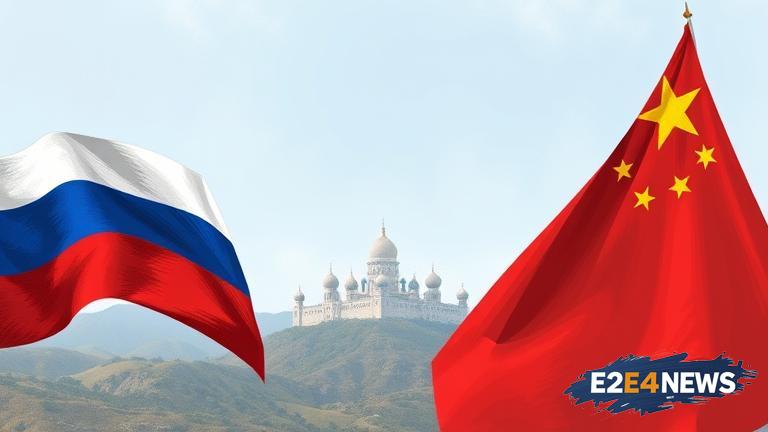In recent years, Russia and China have been working to strengthen their bilateral ties, driven by a shared desire to counterbalance the influence of the United States and other Western powers. This partnership has been marked by increased economic cooperation, including the signing of major trade agreements and the expansion of energy exports. The two nations have also been collaborating on military matters, with a series of joint exercises and the sharing of advanced defense technologies. Furthermore, Russia and China have been providing mutual diplomatic support, including at the United Nations, where they have often found themselves at odds with the US and its allies. The relationship between Russia and China has been described as a ‘strategic partnership’, with both nations seeking to promote their shared interests and values. This partnership has been driven in part by the growing tensions between Russia and the West, particularly following the annexation of Crimea in 2014. Since then, Russia has faced significant economic sanctions and diplomatic isolation, leading it to seek closer ties with other nations, including China. China, meanwhile, has been seeking to expand its global influence, including through its Belt and Road Initiative, a massive infrastructure development project that aims to connect China with other parts of Asia, Europe, and Africa. The partnership between Russia and China has also been driven by their shared opposition to US hegemony and the promotion of a more multipolar world order. In addition to their economic and military cooperation, Russia and China have also been working together on a range of other issues, including counter-terrorism, non-proliferation, and climate change. The two nations have also been seeking to promote their cultural and educational exchanges, including through the establishment of joint research centers and the exchange of students and scholars. Despite their growing ties, however, Russia and China still have significant differences, including on issues such as human rights and democracy. Nevertheless, their partnership is likely to continue to deepen in the coming years, driven by their shared interests and the growing uncertainty of the global landscape. The US and its allies have been watching the development of the Russia-China partnership with concern, fearing that it could undermine their own influence and interests. However, Russia and China have been seeking to reassure them that their partnership is not directed against any third party, but rather is aimed at promoting global stability and cooperation. The partnership between Russia and China has also been driven by their shared desire to promote the use of national currencies in international trade, rather than the US dollar. This effort has been seen as a way to reduce their dependence on the US financial system and to promote their own economic sovereignty. In addition to their bilateral cooperation, Russia and China have also been working together through multilateral institutions, including the Shanghai Cooperation Organization and the BRICS grouping. These institutions have provided a framework for cooperation on a range of issues, including security, economy, and culture. Overall, the partnership between Russia and China is likely to continue to play a major role in shaping the global landscape, particularly as the US and its allies seek to respond to the growing challenge posed by these two rising powers. The future of the partnership will depend on a range of factors, including the state of the global economy, the development of new technologies, and the evolution of the international security landscape. However, one thing is clear: the partnership between Russia and China is here to stay, and it will continue to have a major impact on global affairs for years to come.





